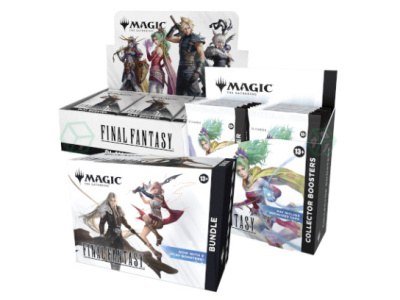View from the Game Store is a bi-weekly column by Marcus King, Director of Retail Operations at Troll and Toad in London, Kentucky. This week, King talks about how he got his start, and gives a Master Class on picking.
Many times people ask me how I got my start in the game industry. There really are two things in my adult life that sparked me into owning my own company. The first happened in 1986 when I got a big re-enlistment bonus in the U.S. Army. For the first time I had $5,000 and I didn't have a bill that had to be paid. I decided to spend $2,500 of it on lead miniatures for my growing miniatures collection. I went to Bosco's in Anchorage, Alaska and asked the fellow there if I could get a big discount on a large miniatures order. My thoughts were that since I had a catalog of stuff, and wanted to special order everything, he might give me 20% off, or maybe even 25%!!! It was an order I had put together for Ral Partha, and I had it all figured out at wholesale, and retail. My order allowed me to hand them the cash on the spot, and for me to get about $3,000 in retail stuff, for $2,400, at a cost to them of about $1,700. I felt this was fair. I thought they might throw in some freebies too, maybe. That may have been naive of me, but I think if a customer today came into my shop wanting that same deal, I would take the $700 profit and be pleased. Instead, I was offered a 5% discount on the $3000 order, so my cost would be $2,850, instead of $2,400.
I declined and called Ral Partha, who pointed me to The Armory, and I started my own basement store with my $5,000 bonus. I set up at conventions for a couple years, and opened my own store shortly thereafter.
Secondly, I learned to pick. I started going to stores and finding rare items, which I would then sell to Lou Zocchi at a profit. Rare wargames, early issues of Dragon or White Dwarf or SPI Wargames magazines, etc. I did this for years, and one weekend in Michigan I made over $10,000 picking a couple stores, and a convention, and started my next game store with the profits.
Today, most distributors do some screening to prevent basement operators from gaining access to merchandise. Of course, keep in mind, distributors sell things, so they NEED new accounts. It is literally working against their own sales to refuse new accounts. So they do try to approve as many as possible. This is good. Because if they have a standard that you must have a commercial lease or such, then often distributors are a great source of help in opening your store. Help in finding fixtures, help in meeting the criteria for having access to merchandise from publishers that demand that the distributors ONLY sell to retail locations.
Picking, though, seems to have become a lost art in today's arena of eBay. People seem to think that since THEY have access to eBay, that everyone does. But everyone does not. And, gamers seem to think that because they have knowledge of values, that everyone does. Also not true. I still pick, and I still teach others to pick. Partially because I enjoy helping people, but also partly because I hope that pickers who find choice items will then flip them fast to me for a nice profit, and I can still make a profit myself.
My picking exploits in the last year include finding a set of German Revised black border Magic cards, a full set at a garage sale for $25, which totaled out in value at over $3,000. I bought a nice box of RPGs from a good will that included R1, R2, R3, RPGA1 and several other rare items, in near mint condition. The box was bought for $100, and the items have yielded over $4500 in sales, and I am not through it yet. I picked a nice wooden handle Craftsman ratchet from around 1896 or so, picking it out of a box marked $2 each, and sold it for $90 right fast. And, a penny collection in a binder that had $20 marked on it and included a 1914-D and a 1922-plain (the 09-s and 09-SVDB and 31-S were all missing). The coins sold to a dealer at $550. And, most recently, a long box of comics bought for $15 yielded an Amazing Spider-Man #300 and a New Mutants #98, selling for a combined $450 in a week.
Picking is still my thing, and it really comes down to two things: acquisition knowledge and sales channels.
Acquisition knowledge is just knowing the values on things and being able to use that knowledge to determine if something is worth more than what it is priced at. Acquisition knowledge can also include the ability to haggle, bluff and read people. But, the most critical aspect is determining value, and this really breaks down into three defined levels of knowledge: broad, specific and precise.
Within that knowledge spectrum, you also have general and specialized types of knowledge. For example, you could know comics very broadly, and then have specific knowledge of Silver Age or Bronze Age comics, and have precise knowledge of Amazing Spider-Man.
Let’s talk Amazing Spider-Man comics (precise) and rare coins (broad). Someone who has precise knowledge of Amazing Spider-Man comics would know which issues had significant events such as the Death of Gwen Stacey in issue #121; or the first appearance of a character such as The Punisher, which first appeared in issue #129. They would also know the values of those comics based on conditions, because a particular copy of #129 might be a steal at $500, and another one might be a bad deal at $150. Additionally, the comic aficionado would recognize that the 12¢ covers would be worth no less than $30 in very nice shape, and no less than $10 even beat up. This would make the decision on what to pay easy, and they would realize how fast and specifically where they could flip those books fastest.
The coin picker with broad general knowledge would perhaps know the two or three key coins in every type set. For example, the 1928 peace dollar is the most valuable in the peace dollar set, while the 1908-S, 1909-S and 1877 are the three most sought after Indian pennies.
The picker would also know how to source these goods. One does not usually successfully pick coins at a coin shop, or pick comics at a comic shop. Historically, I have picked most of my successful comics at a garage or yard sale, and some at flea markets. I have picked RPG games at Salvation Army and Goodwill as well as flea markets, but less often at garage and yard sales. Coins I have most often gotten at moving and estate sales. And, then, usually by asking for them. When the person running the sale asks if they can help me, I often ask, “Do you have any old coin collections for sale?” When they say no, I then ask “Are there any hidden away in the house you'd consider selling?” And about one in 20 say yes. And, about half of those are good picks.
Sales Channels: Selling your picks. I've shared this knowledge with you because I wanted to get you to this very point: the selling of your picks. There are several ways to sell your picks, but they really do break down into two main ways:
Sell to the collector.
Sell to a dealer.
Obviously, if you have the time and inclination, selling to the collector is going to net you the most money. I own a store, and operate both on Amazon and eBay sales platforms, as well as selling on various Facebook Groups, Craigslist and other sites because this is what I do. Full time. All day, every day. I do enjoy it. But, then I don't have a job other than this. This is what I do. So can you, certainly. Even in just your spare time you can operate an Amazon and eBay store. Acquire goods, list, sell, pack, ship, track. Collect sales taxes, pay your sales taxes, or hope you don't get caught not paying your sales taxes. Have a Paypal and Amazon payment system, claim the profits, etc. Again, that is exactly what I do.
Or, you can sell mostly to other dealers. I do this too, but more often I am the dealer buying people's picks.
Currently, at my store I have maybe a dozen pickers who sell to me on a very regular basis, and maybe 20 others who sell to me a few times a year.
Some of my regular pickers are hitting game stores looking for relics, buying on Craigslist, from flea markets, from Goodwill, Salvation Army Thrift Stores, auctions and library sales, from yard and garage sales, and from other such sources. Some of my regular pickers are picking from houses they clear out. Two such pickers bring me tons of baseball and sports cards, Pokemon and Yu-Gi-Oh! cards, and movies and Blu-rays all from homes they are paid by foreclosure companies to go clean out. Those companies don't care what is done with the remnants of the possessions left behind: They just want the houses cleaned out. The cleaners bring me all sorts of items.
I have pick lists for pickers. Lists of key comics, key coins, key toys, various other things to look for both generally (laserdiscs in original sleeves and cases) and specific (Basic NES game Family Fitness Stadium Events). The pick list is several pages if you print it, and I supply this to pickers in the hope they will find these items and flip them to me quickly, and I can then sell the items at a profit.
And, several companies do this. TrollAndToad.com has a buylist for Magic: The Gathering, Yu-Gi-Oh!, Pokemon, D&D and Heroclix, as well as other games. StarCityGames.com has a buy list, though you have to sign it to access it.
Many other companies do, too, I am sure. And, by compiling these buy lists and being familiar with them, you too can become a picker. Regardless of whether you ever sell to one of us resellers, you can make some profits buying those items and selling them.
Today, it is easier and easier to buy and resell than ever before, and the need to own a store to do so effectively is at an all-time low, and in so doing, supplement either your hobby, or even your income. I am preparing a pickers page on Facebook, if you would be interested in joining it (free) then please send me a message on Facebook. Also, if you enjoyed this week’s column send me a friend request if you like.
Everyone have a happy Independence Day!
The opinions expressed in this column are solely those of the writer, and do not necessarily reflect the views of the editorial staff of ICv2.com.

Column by Marcus King
Posted by Marcus King on July 1, 2015 @ 5:12 pm CT
MORE COMICS
'Cat Mask Boy' and 'A Little Step'
July 2, 2025
A Little Step is a tale of two artistic teens, while in Cat Mask Boy, a young boy ventures into the Kowloon Walled City.
Says Next Payroll Is at Stake
July 2, 2025
Dynamite Entertainment says it cannot make next week's payroll unless it is paid for past due invoices.
MORE COLUMNS
Column by Rob Salkowitz
June 30, 2025
Columnist Rob Salkowitz talks to a mid-sized publisher who told him we are at "DEFCON 2, if not DEFCON1."
Column by Scott Thorne
June 30, 2025
This week, columnist Scott Thorne discusses sales on the Final Fantasy set and his experience with Games Workshop's policies on breaking release dates.








